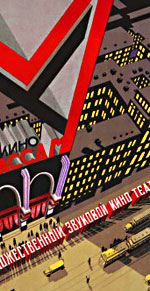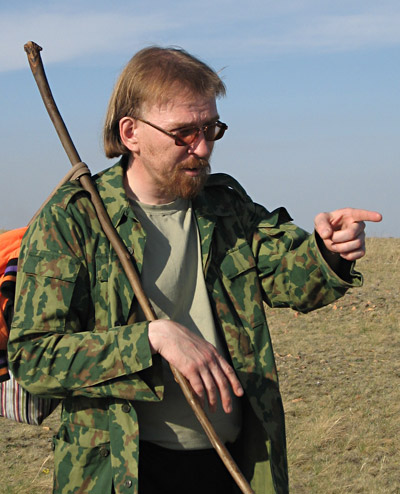
| Jacket 36 — Late 2008 | Jacket 36 Contents page | Jacket Homepage | Search Jacket |
This piece is about 4 printed pages long. It is copyright © Sergei Kruglov and J. Kates and Jacket magazine 2008. See our [»»] Copyright notice. The Internet address of this page is http://jacketmagazine.com/36/rus-kruglov-trb-kates.shtml

Back to the Russian poetry Contents list
The Distribution of Elephants on Islands
The blood of Puerto Rican tango runs as thick as marmalade.
Robinson is overcome, howls, kisses
a hangnail on a calloused toe! Today he is
godfather to a new island literature.
Blissful Friday bows to one side
acknowledging the applause of the sea,
clumsily blows air kisses to the seagulls,
crabs crawl onto the scene with embarrassed bouquets
of salty snot; and now Friday is a Booker!
He holds in his arms an immense violet grant.
Friday is a poet, today he whips up, with feeling,
like a cocktail, “El Choclo,” even
a straw juts out from the middle of his groin!
But Robinson dances around, caressing
a transistor radio in one hand —
“Girl, Don’t Cry Fo’ Louie!” —
at the same time circling behind the happy mother,
the christening in the shadow of a coconut:
bearded and yellow-fanged, frightful, like
John the Baptist’s camel, gray-haired Crusoe
bestows a blessing on his god-child, at the same time
clinging to the chocolate-milk nipple
of the young maser-stylist;
the juice of literature! everything immaculate;
oh if only, prays Friday, the celebration of poetry
and the bestowal of awards never ended! help, O Lord!
But Robinson, turning his radio to a tango — this
is the only white man’s burden here — instructs:
like this, like this, my son! you are the new pride of the word!
Rub the prayer thicker
than coconut oil — to God’s ear! to and fro,
to and fro! tango in the curves! Like this!
While God, red-lipped and swarthy, giggles:
From now on in these islands the spirit
creates where it will.
The Natural View of Poetry According to Slavs
Poetic creation is black gloom.
A blind alley, a dead end, a tunnel, a pothole.
An abandoned house, a deserted village,
a thicket on a starless night, an isolated well,
a bag over the head (and bang) a closet of mothballs (and witchy-woman, bogeyman, black hand, it invisibly watches from the darkness).
Only oddballs are susceptible to it,
sick children, frightened children, worthless, blind children,
children whose legs are paralyzed, with congenital heart defects,
children who wet their beds,
children in whose room suddenly the night-light went on,
children who have grown up without a mother,
children cursed by childhood, the sun, light,
air, foliage, water, badminton, running,
laughter — to the gloom.
Nothing visible either before or behind. But someone
compels you to move through the gloom. You have to move
toward a hypothetical forward.
To find some analogy
with the torment, the agony of this impulse
a child will be able, only if it grows up,
lives, if — in the rare case — has children of his own
and — even farther along — grandchildren, and at the age of seventy,
on a sunny July day, sitting in a chair in the garden where
a grandson or granddaughter plays, laughs, catches bugs,
sweaty, they run to drink water, they slip out of your hands,
they run again, sun, light, — the black needle makes a sudden
puncture in the bright bubble,
and all the essence of the old child-poet
suddenly squeezes into hopelessness:
“Lord, my poor little boy! Don’t let
him fall into the well, catch him, don’t let him go!
Hold him in your hands, stay with him,
sing lullabies to him at night,
abide with him in his heart!” —
and the same thing, it seems, here comes time with the insipid, abundant
tears of an old man. But there are no tears, a look
petrifies, blinds him. He sees and doesn’t see:
ghosts of whose voices — not familiar ones, not these,
but alien, still you have to move forward, catch the ghosts:
you feel the unevenness of the walls: what’s on them?
cracks? doors? niches? epistles in bas-relief?
trifles where a delightful nightmare thaws?
but not get there, and the child against his will,
susceptible to a mysterious feeling,
extends a hand, in order to reach from top to bottom,
discover at the end of his fingers, grasp, squeeze;
and look as far as he can, blinded from the darkness, in order somehow
to get through in the gloom, to somewhere past the turning of the corridor,
and farther, in order to see the unknown road,
He tries to push himself into the gloom. This is
the writing of the text: to overcome the gloom by becoming it.
And nothing white — no butterfly, spectral horse, halftones,
moon, no phosphorescent wind — in the black, damned
river of poetry,
streaming toward an unknown, nonexistent light.
***
— To F.M.
A competition that began in Blois
continues out here in the desert.
Here they ate sweetly, sweetly, a mouth full
of sweet saliva, and they sang sweet angelic songs to us.
At one time there were teeth. But now
November has frozen the rotted gums of the roads
and poplars like desiccated nerves
among the roots of time.
Everyone who lived here, who was eaten — they’ve died, but
promised to return. And now they come back again, it’s
more and more crowded in here. More crowded than Hell.
The reflex to chew is still alive — you feel it?
However, we weren’t born here, in the roster
of competitors we place eleventh,
and we’re completely free to emigrate
from the chewing province into the islands.
To the islands! While they compete and
chew and chew. While the hordes
chew each other.

Sergei Kruglov
Sergei Kruglov(b. 1966) studied journalism at Krasnoyarsk University, and worked as a reporter for the local newspaper in Minusinsk. In 1999 he was ordained as a priest of the Russian Orthodox Church. He has published three books of poetry, one of which was shortlisted for the Andrei Bely Prize.